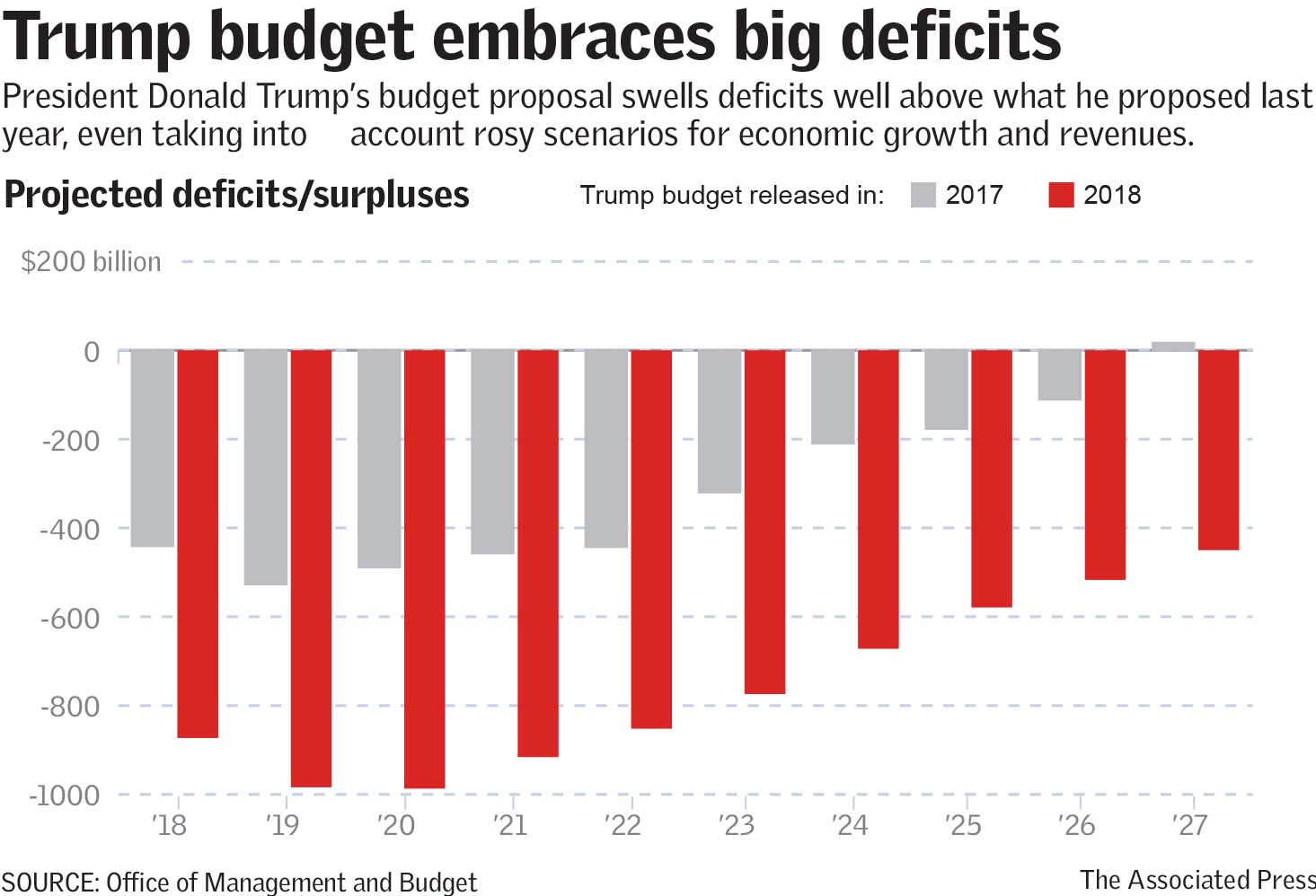Trump, Republicans go on a spending spree — ANALYSIS
WASHINGTON — White House budget director Mick Mulvaney would not allow cameras into the briefing room as he outlined President Donald Trump’s budget to reporters. He explained, “This is going to be really, really boring and really, really hard.”
The session also threatened to be really, really embarrassing to Mulvaney, a one-time GOP congressman from South Carolina who came to Washington as an uncompromising fiscal hawk.
As the head of the administration’s Office of Management and Budget, Mulvaney has found himself in the unenviable position of defending a budget that — if it actually lives up to all its impossible promises — stands to increase the $20 trillion national debt Trump inherited by an extra $7 trillion over the next decade.
In fact, on Tuesday when a senator asked Mulvaney if, as a congressman, he would have voted for Trump’s $4.4 trillion budget for fiscal year 2019, the budget director answered he probably would not have.
Later, spokeswoman Meghyn Burns released a statement that clarified: “Just to be clear, Director Mulvaney was referring to the recent caps deal when answering Senator (Patty) Murray’s question this morning. Naturally, he would vote for the President’s FY19 budget that he released yesterday.”
If that seems confusing, that’s because it is. Last week’s “caps deal” is a two-year spending plan that Congress passed and Trump signed to end another government shutdown. The OMB has reworked its FY19 numbers to reflect the two-year bill, which increased spending by $300 billion.
“The GOP bluffs on spending and deficits,” observed Brian Riedl, a former GOP staffer and now a senior fellow at the right-leaning Manhattan Institute. “They talked a good game under President Clinton and then went on a spending spree under President Bush. They talked a good game under President Obama,” also and they’re back on a spending spree under Trump.
Trump talked a good game as the 2016 GOP presidential nominee when he hit President Barack Obama for doubling the national debt, which rose from some $10 trillion to $20 trillion during the Obama years.
Problem: If the Trump plan’s rosy scenarios fall through, GOP spending is likely to race past its rosy $7 trillion deficit projection through 2028 and accumulate enough debt to match or exceed the dollar amount of debt racked up under Obama.
OMB projects fiscal year 2019 will come in just under $1 trillion in the red, while the Committee for a Responsible Budget has predicted a 2019 deficit as high as $1.2 trillion. That’s around double the $587 billion shortfall from Obama’s last fiscal year.

Those politicians who actually want to impose fiscal sense find themselves in a maze already choked with spending that would be painful to curb, and rules that present no ready way to good budgeting.
“There is a way to get off this treadmill of trillion-dollar deficits,” Mulvaney argued, “but we have to take the spending side extraordinarily seriously.”
One approach, he said, was to impress upon Congress that “you don’t have to spend all of this money.”
Like that’s going to happen.
Riedl sees a “Trump effect.” The president “got elected promising big tax cuts and no reforms to Social Security and Medicare.” His GOP primary wins convinced Republican politicians that even GOP voters don’t really want spending cuts.
“I can tell you having worked in the Senate for six years,” Riedl added, “a lot of Senate Republicans are privately relieved at having increased domestic caps too.”
It doesn’t help that the Republican president is at peace owing tons of money. In 2016, he boasted to CBS News’ Norah O’Donnell that he was the “king of debt. I’m great with debt. Nobody knows debt better than me. I’ve made a fortune by using debt, and if things don’t work out, I renegotiate the debt. I mean, that’s a smart thing, not a stupid thing.”
According to Politifact, Trump filed for Chapter 11 bankruptcy six times over 25 years.
Trump also knows the downside of too much debt. In “The Art of the Deal,” he wrote of New York in the 1970s: “The city’s debt was rising to levels that started to make everyone very nervous. For the first time you heard people talking about the city going bankrupt. Fear led to more fear. Before long New York was suffering from a crisis of confidence. People simply stopped believing in the city.”
With Republicans like Trump, it could happen to the country.
Contact Debra J. Saunders at dsaunders@reviewjournal.com or 202-662-7391. Follow @DebraJSaunders on Twitter.























